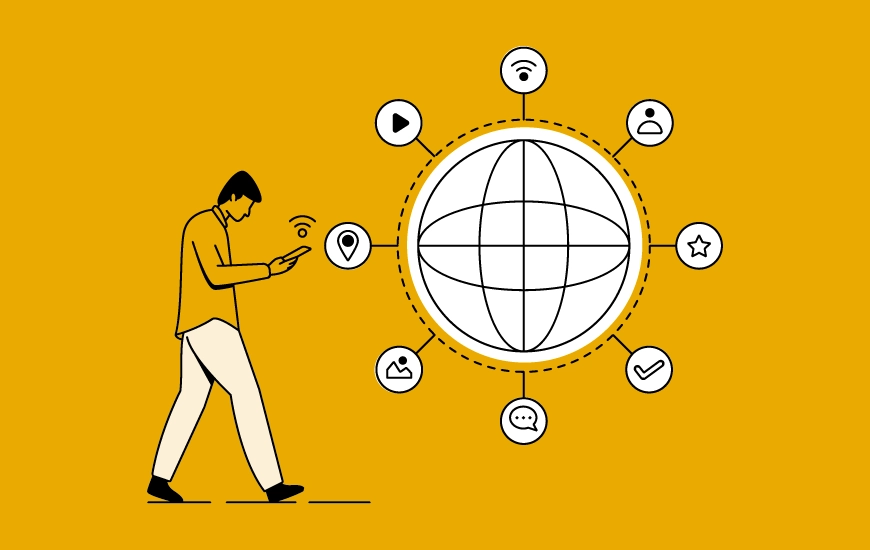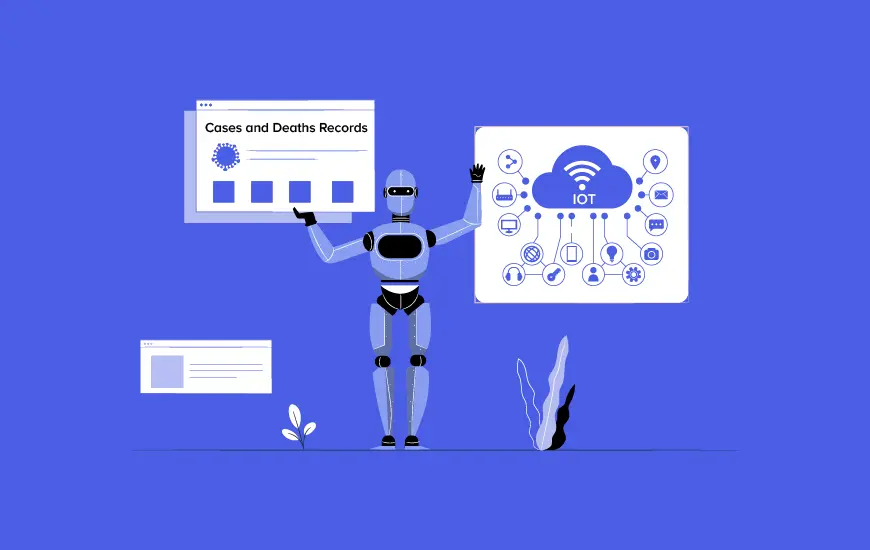- The merger: How AI and IoT are transforming businesses?
- Advantages of AI and IoT in business
- Data collection, sharing, and formulating user perceptions
- Elimination of downtime
- Strengthening security measures
- Increased operational efficiency
- Helps in processing business analysis
- Better Risk Management
- Scope for new and improved products and services
- AI and IoT use cases in business
- Wearables
- Robotics
- Smart Homes
- Self-driving vehicles
- Amazon Go
- Healthcare
- Smart Cities
- Future of AI and IoT in Business
- How Can Appinventiv Help You Leverage The Growing IoT and AI Ecosystem
- FAQs
Before autonomous drones and machine learning came into the foray, James Cameron enthralled the world with his dream project, The Terminator, in 1984. This is where he introduced ‘Skynet,’ a futuristic artificial superintelligence network that wants to replace humans with machines. Much has been debated about the film franchise ever since, as scientists passed it off as a fan service action series, yet the seed of technological brilliance was sown. Whether Artificial Intelligence will take over the world or not, it certainly has given businesses a means of revolution and, to readers/debaters like us, food for thought.
The integration of IoT and AI has expanded beyond smart home security and wearables and is now an essential component of businesses. Numerous companies, including Amazon, Oracle, and Microsoft, have incorporated AI into their IoT applications to optimize their operations. These advanced technologies are now widely utilized across various industrial domains, such as online businesses, robotics, healthcare, and cloud computing, making them a crucial part of the rapidly evolving digital ecosystem.
AI and IoT are redefining the way businesses used to perform. On the one hand, AI, with its powerful subset of machine learning, has paved the way for smarter task execution with real-time analysis and greater interaction between humans and machines. IoT, on the other hand, has upped the scale of communication between devices and humans via effective intelligent technology. The confluence of the Internet of Things and Artificial Intelligence makes each other’s applications more varied and powerful.
This blog will dwell on IoT and AI in business and how these two technologies will impact the future of businesses. In addition to looking at the various advantages of AI and IoT in business, we will also look at multiple use cases defining the permeation of these technologies in our day-to-day lives.
The merger: How AI and IoT are transforming businesses?
The advent of AI and IoT has drastically changed the entire business landscape. The amalgamation of IoT and AI in business can help a business make informed decisions with zero errors. While IoT accumulates large amounts of data through device connectivity via the internet, AI in business helps in assimilating and evaluating this data.
Machine learning in IoT devices helps to identify patterns and detect any faults in data collection through extremely advanced sensors. Intrinsic difficulties such as stimulation to air, temperature, humidity, pollution, sound, vibrations, lights, etc., are derived with this technology over some time.
Unlike traditional technology, AI and machine learning in business make operational forecasts 20x faster with heightened accuracy. This is the reason why businesses that use artificial intelligence see a growth in their revenue numbers – a validation of which can be seen in the graph below:
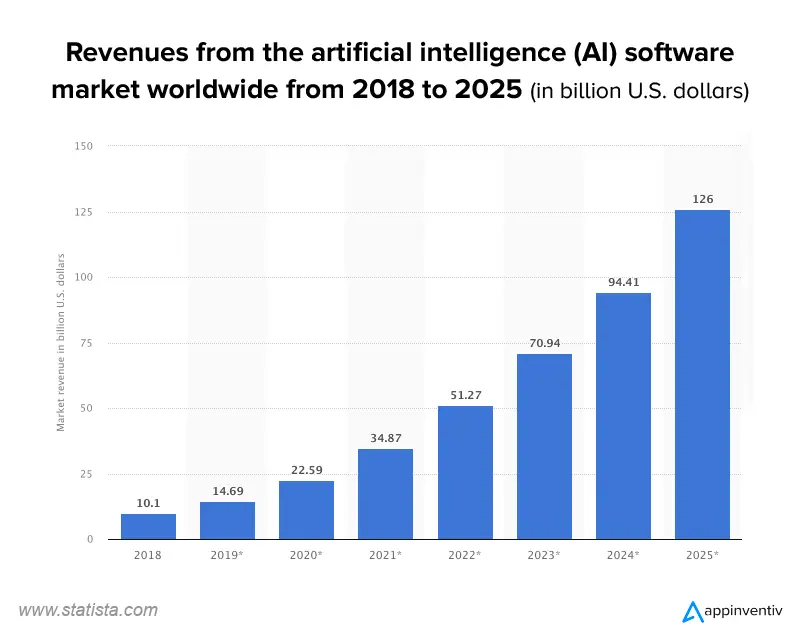
The role of artificial intelligence in IoT’s revolution has helped in a massive revenue boost which also means the sale of more connected devices. According to the reports, the IoT Devices market was valued at $102.35 Billion in 2022 and is expected to reach $508.25 Billion by 2030, witnessing a CAGR of 22.19% from 2023 to 2030.
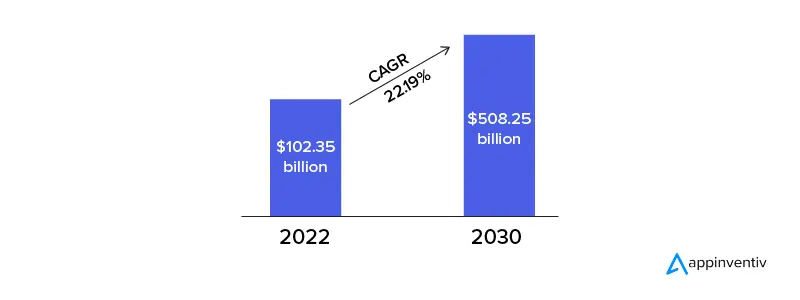
The demand for IoT in business is certainly going uphill. IoT and AI are currently in demand by every business, whether it’s a Fortune 500 company or a startup. Since there is no limit to either’s abilities, companies wish to use them to their full potential and unbridle their potentiality to the world.
As IoT collects data, AI takes the onus of converting it into meaningful and creative actions. Data exchange happens through sensors, and in the process, a few of the following things happen:
- Data insights are more accurately obtained, monitored, and evaluated
- The entire process becomes faster and more efficient
- Surveillance against cyber-attacks is more defined and stronger
Advantages of AI and IoT in business
Together AI and IoT are unstoppable forces of technology. IoT and AI in business can be integrated to enjoy the benefits the two provide. Here are the significant benefits of IoT and AI in business:
Data collection, sharing, and formulating user perceptions
Data collection is vital for a business’s growth and development and is one of the key applications of AI used in business. IoT devices enable the tracking, recording, and analyzing of user behavior and interactions. This data is then utilized by businesses to improve consumer experiences. Adopting an IoT strategy allows businesses to gain valuable insights from consumer information, and AI facilitates efficient management and utilization of this data.
Elimination of downtime
Another one of the vital benefits of IoT and AI used in businesses is the elimination of downtime. Manufacturing companies utilizing heavy machinery frequently face unforeseen breakdowns, leading to substantial downtime and financial losses. The integration of AI and IoT has made predictive maintenance a reality. An AI-enabled IoT platform can use advanced analytics to forecast machinery failures and breakdowns beforehand. This proactive approach enables organizations to plan and take necessary actions ahead of time, thereby reducing disruptions to their operations.
Strengthening security measures
In the current business landscape, safeguarding your organization from data breaches and theft is paramount. One effective solution is implementing an IoT platform that utilizes AI to protect sensitive data, preventing unauthorized access. Machine-to-machine communication is used to identify potential threats and respond automatically to hackers. For example, IoT sensors installed in ATM machines can quickly detect suspicious activities and notify law enforcement agencies for prompt action.
[Also Read: How to Ensure Cybersecurity in the Age of IoT]
Increased operational efficiency
AI and IoT in business are important for improving the overall operational processes and making informed predictions, which results in increased operational efficiency. Investing in IoT and AI is crucial in this tech-savvy world as it provides insights into redundant and time-consuming activities. For example, Google uses AI and IoT-based business solutions that have reduced cooling costs in its data centers. Businesses can also identify areas that require optimization to ensure efficiency is not overlooked.
Helps in processing business analysis
Effective inventory management is crucial for businesses to balance demand and supply. AI in business accurately predicts restocking needs, which helps relieve pressure on stock levels. This is especially useful for retailers who may face challenges with overstocking. Furthermore, IoT applications gather data and provide analytics for stock maintenance, offering more accurate and efficient solutions than manual methods.
Better Risk Management
Efficient risk management and mitigation are a few of the most sought-after advantages of IoT in business. Earlier, we mentioned how AI and IoT platforms help in maintaining cybersecurity. Now, coming to risk management, which includes handling financial loss, personnel safety, and cyber threats, the pair effortlessly deal with situations and respond promptly to mitigate potential risks. For example, Fujitsu, a Japanese IT equipment and service provider, ensures worker safety is maintained through data collected from wearable devices with the help of AI.
Scope for new and improved products and services
Natural Language Processing (NLP) technology which aims to improve communication via speech, text, or gestures, has augmented the transmission of information between humans and devices. It helps to fetch data that a human may never be able to do physically. Furthermore, AI-powered robots have given a whole new meaning to monitoring and inspection, especially using drones in the construction industry, which never existed. This proves how strong the future of IoT and AI in businesses is.
AI and IoT-based solutions have helped fleet management for commercial vehicles by monitoring every measurable information. For instance, Rolls Royce is an exemplary business that utilizes IoT and AI to implement maintenance requirements for airplane engines, leveraging AI technology to uncover valuable insights and patterns.
AI and IoT use cases in business
Now that you know how AI and IoT-based solutions help leverage business opportunities, let us explain a few AI and IoT use cases to understand the role of artificial intelligence and IoT in business and how they have helped provide better user experiences. Many of these examples also make up for the most cutting-edge and futuristic trends to watch out for.
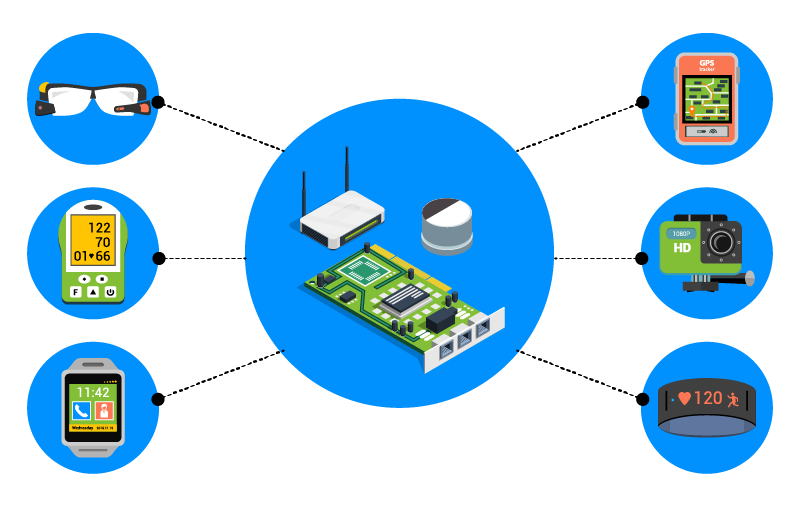
Wearables
Wearables have become integral in the current AI landscape, with fitness trackers, smartwatches, panic buttons, remote monitoring systems, GPS trackers, and music systems being the most popular examples. These devices are an essential part of the IoT ecosystem, and offer access to accurate information with the help of IoT applications that can be downloaded on the smart devices.
[Also Read: How Much Does Wearable App Development Costs?]
Robotics

One of the most famous applications of IoT in business is IoT-based intelligent robots. These IoT and AI solutions for businesses offer various forms of assistance to humans and play a crucial role in areas such as facial recognition, deep learning, big data analytics, and robotics.
Robots and robotics, the real-world IoT examples in business, have been the frontrunners of technology for decades. Robots can learn and quickly adapt to new environments by combining AI and IoT technologies, enabling precise communication through embedded sensors. This enhances the manufacturing process, leading to streamlined operations and cost savings.
Smart Homes
AI-powered IoT technology has revolutionized the smart home concept, enabling users to control various appliances through their smartphones conveniently.
With a simple command, lights, fans, TVs, thermostats, and ACs can be managed from anywhere, even while traveling. This technology eliminates the need for manual operation, providing greater convenience and flexibility.
AI in smart homes enhances comfort and efficiency, allowing users to check appliance status and pre-set water temperature before arriving home. The smart home ecosystem was valued at $79.6 billion in 2022, which highly reflects the increasing significance of AI in business.
Self-driving vehicles

Another one of notable AI use case in business is autonomous cars. With powerful sensors, installed cameras, and robust hardware and software integration, an autonomous car gathers monumental information: roads, traffic, additional routes, navigation, weather conditions, consumer behavior, and whatnot.
Self-driving cars are the prime examples of the significant role AI and IoT plays in future technology. Although safety concerns may arise during the initial experiences with driverless vehicles, it is vital to understand that the learning capabilities and powerful AI mechanisms integrated into these cars will prioritize passenger safety above all else.
Also Read- AI in Self-Driving Cars – How Autonomous Vehicles are Changing the Industry
Amazon Go
Amazon Go is truly one of the masterstroke AI applications in businesses. Amazon utilizes IoT technology to enhance the overall shopping experience for its customers at its retail outlets. By leveraging IoT sensors and advanced AI algorithms, the shopping process is optimized for user convenience. As customers browse through the store, sensors detect their activities and automatically add selected items to their virtual carts. When the customers put the items back, they are immediately removed from the cart. The technology is seamlessly connected to the customers’ payment methods, enabling automatic payment when they leave the store. This innovative approach, powered by AI, computer vision, deep learning algorithms, and sensor fusion, is known as the ‘Just Walk Out’ technology.
[Also Read: AI in Retail – How Artificial Intelligence is Improving the Retail Shopping Experiences]
Healthcare

The aftermath of the coronavirus pandemic has made everyone extra cautious with their health. Thus, technologies like AI and IoT are leveraging the entire healthcare system. The IoT in business applications, powered by AI, helps in collecting data to provide preventive measures for a person/patient, early detection and providing drug administration. It draws data from internet-powered medical devices, medical records, fitness trackers, mobile healthcare apps, etc. Many healthcare companies around the globe are making IoT investments so that people stay safe under such hazardous conditions.
Smart Cities
This is the biggest example to show the prowess of the IoT and AI in business combined. Things like smart traffic management, smart parking, smart waste management, smart policing, smart governance, and many other factors are the components that constitute a smart city. The Internet of Things for smart cities changes how cities operate and delivers amenities to the public, including transportation, healthcare, lighting, etc. Smart cities are arguably a futuristic concept and have a lot of ground to cover.
Application development companies like Appinventiv leverage the importance of IoT in business and have done a tremendous job of integrating the technology into various business types and creating something unconventional out of the stale scheme of things. AI is truly reinventing IoT along with other modern-day techs, and businesses that are vigorously using this technological emergence are flourishing. No second thoughts need to be spared to explain — The future of IoT is AI and will remain so.
Future of AI and IoT in Business
The Future of AI and IoT in business offers vast potential for driving efficiency, improving customer experiences, enabling data-driven decision-making, and creating new opportunities for growth and innovation. By implementing IoT and AI in businesses, you can get:
Enhanced Decision Making: AI and IoT technologies work together to gather real-time data for businesses. This data is then analyzed to make informed decisions based on accurate predictions and actionable insights.
Increased Automation: Integrating AI and IoT enables businesses to automate processes, improving operational efficiency and reducing human errors. AI systems can manage and control IoT-connected smart devices, leading to streamlined workflows.
Personalized Customer Experiences: IoT and AI in business allow the stakeholders to gather and analyze customer data, preferences, and behavior patterns in real-time. This data can provide personalized experiences, customized recommendations, and targeted marketing campaigns, improving customer satisfaction and loyalty.
Predictive Maintenance: Detecting anomalies and defects easily is the most vital factor that defines the bright future of AI in business. IoT devices can monitor equipment performance and collect data, allowing for predictive maintenance. By analyzing this data, AI algorithms can identify patterns and anomalies, predict potential failures, and schedule proactive maintenance. This reduces the overall downtime and optimizes resource allocation.
Supply Chain Optimization: Integrating AI and IoT solutions for business enhances supply chain management by providing real-time visibility into inventory levels, transportation logistics, and demand patterns. This results in optimized inventory, reduced costs, enhanced delivery efficiency, and minimized delays.
Improved Safety and Security: One of the most sought-after benefits of AI integration in business is increased safety and data security. AI-powered systems can monitor and analyze data generated by IoT devices to detect potential security threats. This allows for proactive measures to be taken in response to security breaches, thereby enhancing cybersecurity measures and safeguarding sensitive business and customer information.
Smart Workplaces: AI and IoT have the potential to revolutionize workplaces by creating smart environments that optimize energy usage, automate repetitive tasks, and improve employee productivity. Daily operations can be efficiently managed by utilizing connected devices and AI assistants, and personalized experiences can be offered.
IoT applications are reshaping connectivity, enabling devices to communicate seamlessly and optimizing various processes for increased efficiency in diverse environments.
Industry-Specific IoT and AI Applications in Business: AI and IoT are highly versatile technologies that have numerous applications across a wide range of industries, such as healthcare, manufacturing, retail, transportation, and agriculture. By leveraging AI and IoT in business, you can streamline your processes and gain valuable insights into the respective sectors.
How Can Appinventiv Help You Leverage The Growing IoT and AI Ecosystem
The future of AI in business is promising and transformative. IoT and AI are revolutionary technologies that offer tremendous business opportunities and are poised to shape the future. IoT facilitates seamless communication and data exchange among diverse devices and objects. At the same time, AI empowers machines to learn, reason, and make informed decisions. The convergence of IoT and AI empowers businesses to gather extensive real-time data, analyze it intelligently, and extract valuable insights. This combined power enables businesses to enhance operational efficiency, optimize processes, and drive innovation through data-driven decision-making.
Appinventiv is an AI development company that can assist in developing innovative applications, integrating AI algorithms with IoT devices, and harnessing the power of data analytics to drive actionable insights. Our tech experts can design robust IoT and AI solutions for businesses that can enable them to automate processes, optimize operations, improve decision-making, and enhance customer experiences.
Considering the latest statistics and the increasing market size of AI and IoT solutions for businesses, collaborating with an AI and IoT services development firm like Appinventiv can help you leverage the necessary technological capabilities to thrive in the rapidly evolving digital ecosystem.
As a dedicated IoT development company, we recently designed ActiDrive, a gesture-recognition application based on IoT Technology, enabling drivers to drive hassle-free. The intuitive app allows drivers to stay in touch with their mobile device’s functionalities with just the help of hand gestures, thereby keeping their eyes on the road at all times.
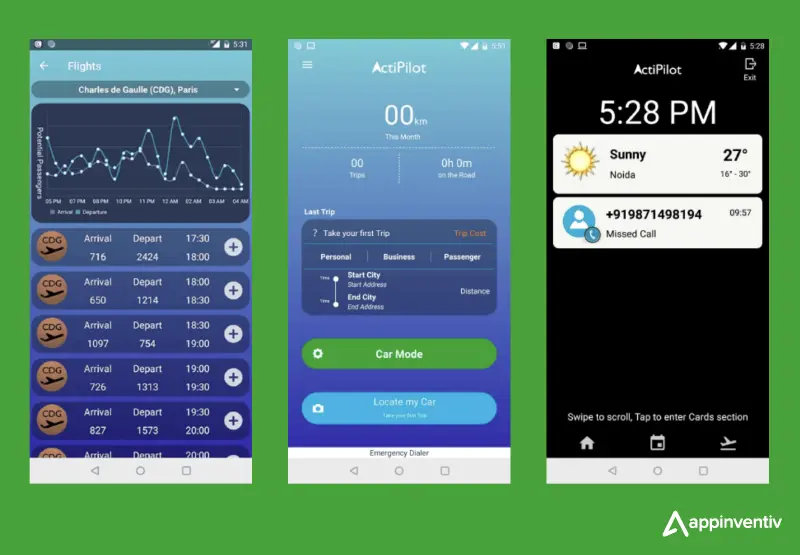
Our latest innovation, Vyrb, an AI-based social media application, has received over $1 Million in funding while bagging 50M+ downloads. The app allows users to send and receive audio messages, leveraging the convenience of Bluetooth technology.
Vyrb’s innovative features also enable voice posting to popular social media platforms like Twitter and Facebook, all made possible through Bluetooth glasses Vyrb is a game-changer for wearable technology enthusiasts who want to amplify their communication and social media presence.
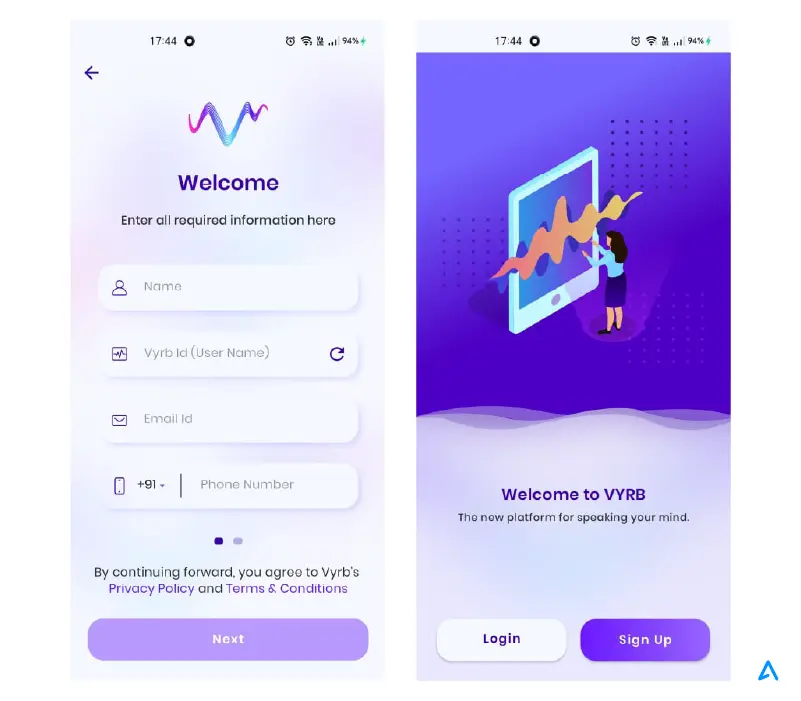
Get in touch with our team if you, too, wish to foster business growth by implementing state-of-the-art IoT and AI solutions.
FAQs
Q. How is AI related to IoT?
A. AI or Artificial Intelligence is the technology to instill intelligent behavior at par with or beyond the human brain’s capabilities. IoT, or the Internet of Things, connects various devices/machines and accumulates the data collected. Together, they form connected intelligence, which is a brute force of technology, and that’s why you have so many Internet of Things companies coming up.
Q. How does IoT help in business?
A. IoT empowers businesses by delivering real-time data and insights from interconnected devices, enabling the optimization of processes, predictive maintenance, and efficient resource management. It enhances operational efficiency, facilitates data-driven decision-making, and fosters the creation of innovative business models and opportunities through seamless connectivity and intelligent automation. Some benefits of IoT in business include advanced decision-making, improved operational efficiency, etc.
Q. Does IoT use AI?
A. It certainly does. The AI systems then take over the huge data collected via connected or IoT devices to determine result-oriented outcomes. With each passing day, both technologies are getting more flexible and smoother AI applications for IoT, from vehicles to entire cities, can be controlled with the amalgamation of this concept.
Q. How does AI help IoT?
A. IoT’s job is to allow devices to connect and create an interface for a free flow of information. AI senses this data and uses it to create optimized results. AI’s subset Machine Learning helps understand the process and gives output based on guided learning. The IoT Machine Learning combination powered by AI changes every business type from its traditional roots. Smart cities, autonomous vehicles, smart homes, smart retail, etc., are prominent examples of IoT and AI in business examples.
Q. Which is the best — AI or IoT?
A. AI in business and IoT in business are two entirely different prospects that, when combined, become even more powerful. With Cloud, IoT has become bigger than ever. Since they are so much in demand, AI-focused IoT startups are on the rise.
Q. Why is artificial intelligence important to business?
A. For internal and external purposes, AI in business is an apex need for all organizations. It gives a competitive advantage, improves efficiency, reduces redundancy, gives automated responses, and helps maintain order within various functional areas of the organization. The great thing about AI is that it always seems futuristic despite being around for so many years.
Q. How is AI used in business?
A. Artificial Intelligence is crucial for businesses as it facilitates automating repetitive tasks, improving operational efficiency, and elevating decision-making through advanced data analysis and predictive modeling. Furthermore, AI empowers businesses to provide personalized experiences, optimize processes, and foster innovation by leveraging intelligent algorithms and machine learning techniques.


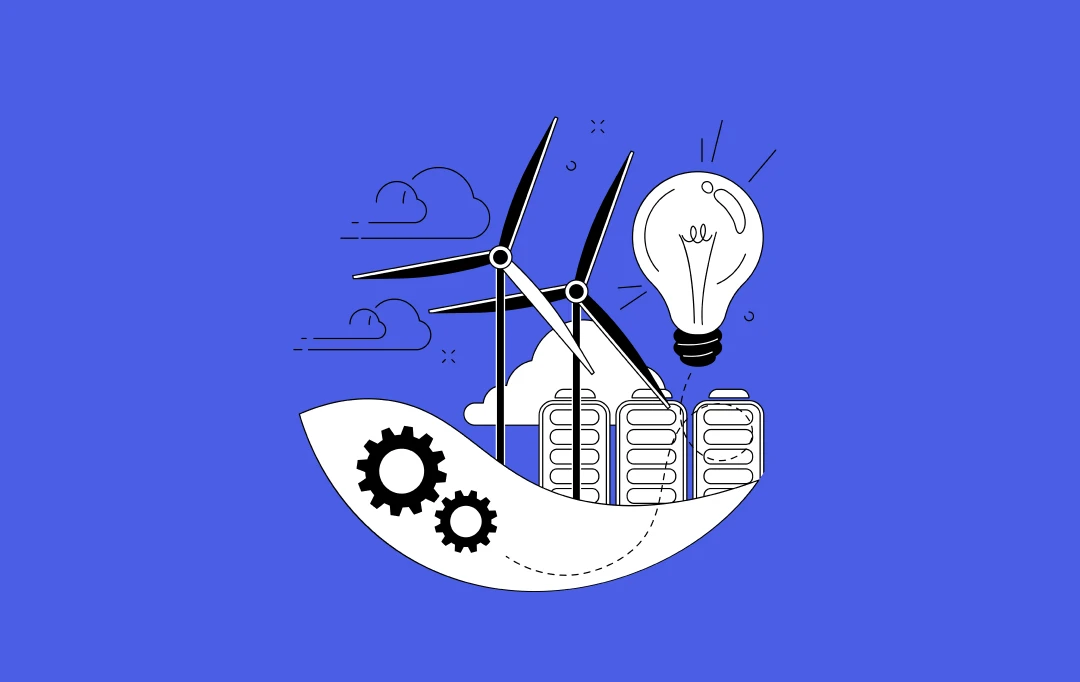
Top 10 Use Cases and Benefits of IoT Energy Management Changing the Power Industry
The escalating demand for energy consumption worldwide is projected to reach around 800 exajoules by 2050, a big jump from over 600 exajoules in 2019. This fastest-growing global energy use is throwing a major curveball - prioritizing smart energy for waste management. In this pursuit, the rise of the Internet of Things (IoT) offers a…
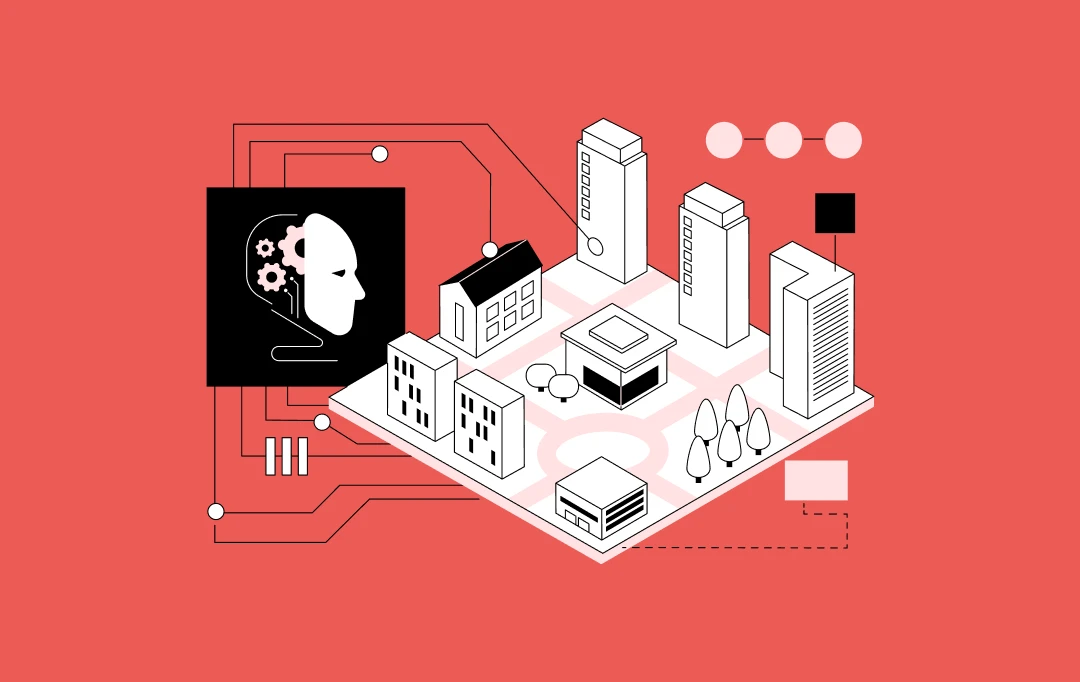
IoT in Construction: 10 Transformative Use Cases and Their Impact
The construction industry has always been the backbone of our infrastructure, but it hasn't always been quick to adopt new technology. Nevertheless, this fact is changing with the evolution of the Internet of Things (IoT). IoT has moved beyond being just a buzzword to a fully integrated tool transforming how construction projects are planned, executed,…
